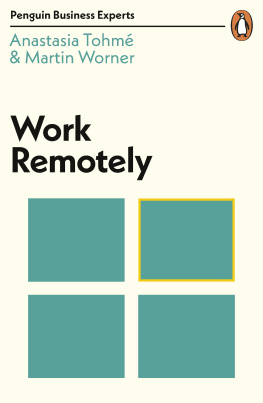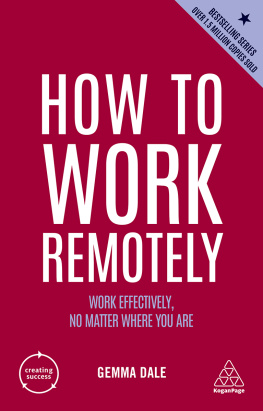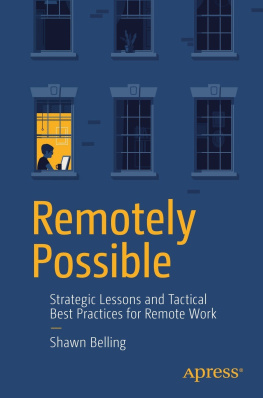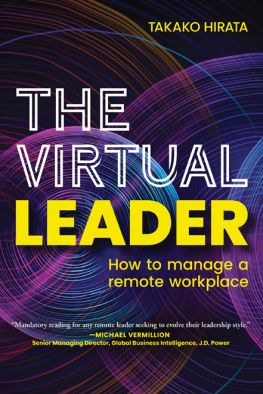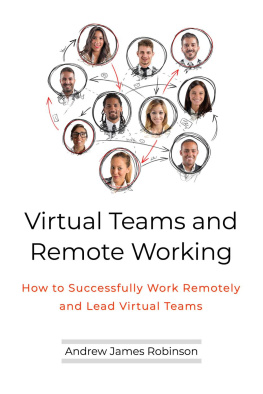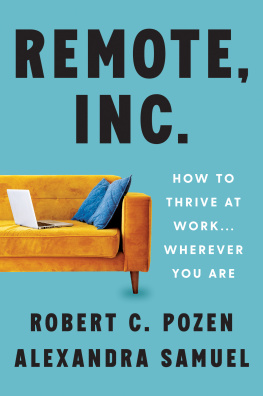About the Authors
Martin Worner is a co-founder and Head of Product at Confio, building trade, a blockchain aimed at regulated financial institutions. He has worked in various product and technology roles in blockchain since 2017, mostly in remote teams. He has a capital markets and technology background, initially working at UBS, Morgan Stanley, and then starting and growing a company with technology expertise, serving investment banks, funds and hedge funds. He has worked with teams around the world, and was an early adopter of remote working. He lives in the UK and works with a fully remote team.
Anastasia Tohm is a global talent acquisition and HR expert. She has been recruiting for numerous companies expanding their businesses, and has been setting up HR departments and growing teams in fields such as technology, blockchain, real estate and financial services across six continents. She currently runs the international talent acquisition team at Global Upside Corporation, a leading global services company, and lectures HR Management and Managing Remote Teams at Geneva Business School. She holds an MBA from IE Business School and a dual degree in HRM from McGill University and Universit de Montral. She lives in Spain and has been fully remote since 2018.
Anastasia Tohm
and Martin Worner
WORK REMOTELY

PENGUIN BOOKS
UK | USA | Canada | Ireland | Australia
New Zealand | India | South Africa
Penguin Books is part of the Penguin Random House group of companies whose addresses can be found at global.penguinrandomhouse.com.

First published by Business in 2021
Copyright Anastasia Tohm and Martin Worner, 2021
The moral right of the copyright holders has been asserted
Text design by Richard Marston
ISBN: 978-0-241-48212-4
This ebook is copyright material and must not be copied, reproduced, transferred, distributed, leased, licensed or publicly performed or used in any way except as specifically permitted in writing by the publishers, as allowed under the terms and conditions under which it was purchased or as strictly permitted by applicable copyright law. Any unauthorized distribution or use of this text may be a direct infringement of the authors and publishers rights and those responsible may be liable in law accordingly.
Introduction
Since the modern office emerged, remote working has been the exception rather than the norm. A 2018 survey found that only 3 per cent of employees in America worked from home more than half of the time. But in just over a year, with the arrival of the global coronavirus pandemic in 2020, thousands of companies were forced to close offices and many millions of people had to work from home. In the first wave of the virus in the UK in April 2020, nearly 50 per cent of those in employment began to work away from the office. Companies all over the world are embracing remote working. Jack Dorsey, the CEO of Twitter, has moved all jobs that dont require a physical presence in the office to remote positions. And many more have followed suit. Traditional offices are now a thing of the past. To reap the benefits of remote work, we need to examine what the workplace means and recognize the opportunities that flexible work offers. We must become more innovative and proactive in our approach and bring about greater conscious and rigorous experimentation with our ways of working. Remote has become the new normal. And its here to stay.
Its time to rethink how, where and why we work. Its time to join the work remotely revolution.
The case for remote working
Widen your work horizons
Without the geographical constraints of a central office, many employers are able to tap into a larger talent pool beyond the local labour market. In a survey of hiring managers, 64 per cent said they were now more likely to consider remote candidates for a position, while the majority found the virtual hiring process a cost-effective form of talent acquisition. Companies can channel the money no longer needed for rent into offering higher wages and attracting more talented staff. No longer being tied down to a particular city or location means employees can pursue their careers while still remaining close to their family and social networks. A highly attractive concept according to one study which found that respondents would require to be paid $24,000 more to no longer be near family.
Remote working offers a more level playing field for those hampered by invisible barriers, as traditional discriminatory factors such as race, age, gender, class and disability are reduced in the hiring process. Simply taking away the physical and financial barriers involved in commuting can have a huge impact on those without easy access to an office, or who cannot afford or may not be able to do so. Once in the virtual workspace, employees from minorities experience less prejudice, one study found, due to a focus on results rather than traditional hierarchical and political factors.
Increase your productivity
Several recent studies have confirmed what most of us already knew: working at home boosts productivity among workers. One investigation of over 13,000 global businesses revealed that 85 per cent found that their teams were more productive when working remotely. Each remote worker was worth almost 50 per cent more than their office-based counterpart.
Benefit from a happy and healthy workforce
For many employees, working from home means they have greater flexibility and autonomy to plan their day, more time for hobbies and interests, for socializing with family and friends and looking after pets. With hours saved by not commuting, workers can dedicate more time to exercise and to preparing healthier meals. One study found 77 per cent of employees claimed that working from home had improved their overall health and wellbeing. A survey by KBC Bank showed that worklife balance has increased by 87 per cent; 83 per cent of those interviewed said that they can work with greater concentration; 72 per cent feel less stressed at work; 68 per cent are more motivated; and 62 per cent can organize their work better. The study also stated that there are benefits for employers too, with employee retention up 76 per cent for workers with flexible work options.
Embrace new leadership techniques
Switching to a virtual system of communication has eroded workplace hierarchical structures and traditional political systems within companies. The ability to Zoom call into our colleagues living rooms has broken down social barriers; it can be positive to realize that our managing directors have families, homes to run and personal struggles too. Many organizations are embracing a shift towards a more humane, relatable form of leadership.
Live rent free
Grand offices in glass skyscrapers on premium central city plots cost companies millions every year. In New York, office space costs, on average, $14,800 per employee annually, including cleaning services, food and catering fees and taxes. Saving on significant outgoing costs like this frees up money that can be spent on attracting talent or upgrading technology.
Lower your carbon footprint
If those who have a work-from-home compatible job and a desire to work remotely did so just half the time, greenhouse gas reduction would be the equivalent to taking the entire New York state workforce off the road.

